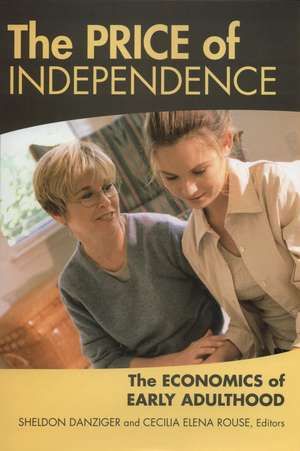The Price of Independence: The Economics of Early Adulthood
Editat de Sheldon Danziger, Cecilia Elena Rouseen Limba Engleză Hardback – 6 ian 2008
More and more young men and women today are taking longer and having more difficulty making a successful transition to adulthood. They are staying in school longer, having a harder time finding steady employment at jobs that provide health insurance, and are not marrying and having children until much later in life than their parents did. In The Price of Independence, a roster of distinguished experts diagnose the extent and causes of these trends. Observers of social trends have speculated on the economic changes that may be delaying the transition to adulthood—from worsening job opportunities to mounting student debt and higher housing costs—but few have offered empirical evidence to back up their claims. The Price of Independence represents the first significant analysis of these economic explanations, charting the evolving life circumstances of eighteen to thirty-five year-olds over the last few decades. Lisa Bell, Gary Burtless, Janet Gornick, and Timothy M. Smeeding show that the earnings of young workers in the United States and a number of industrialized countries have declined relative to the cost of supporting a family, which may explain their protracted dependence. In addition, Henry Farber finds that job stability for young male workers has dropped over the last generation. But while economic factors have some influence on young people's transitions to adulthood, The Price of Independence shows that changes in the economic climate can not account for the magnitude of the societal shift in the timing of independent living, marriage, and childbearing. Aaron Yelowitz debunks the myth that steep housing prices are forcing the young to live at home—housing costs actually fell between 1980 and 2000 once lower interest rates and tax subsidies are taken into account. And Ngina Chiteji reveals that average student loan debt is only $3,500 per household. The trend toward starting careers and families later appears to have more to do with changing social norms, as well as policies that have broadened access to higher education, than with changes in the economy. For better or worse, the current generation is redefining the nature and boundaries of what it means to be a young adult. The Price of Independence documents just how dramatically the modern lifecycle has changed and offers evidence as an antidote to much of the conventional wisdom about these social changes.
Preț: 429.94 lei
Nou
Puncte Express: 645
Preț estimativ în valută:
82.27€ • 86.13$ • 68.07£
82.27€ • 86.13$ • 68.07£
Carte indisponibilă temporar
Doresc să fiu notificat când acest titlu va fi disponibil:
Se trimite...
Preluare comenzi: 021 569.72.76
Specificații
ISBN-13: 9780871543165
ISBN-10: 0871543168
Pagini: 321
Dimensiuni: 152 x 229 x 30 mm
Greutate: 0.63 kg
Editura: Russell Sage Foundation
Colecția Russell Sage Foundation
ISBN-10: 0871543168
Pagini: 321
Dimensiuni: 152 x 229 x 30 mm
Greutate: 0.63 kg
Editura: Russell Sage Foundation
Colecția Russell Sage Foundation
Notă biografică
SHELDON DANZIGER is Henry J. Meyer Distinguished University Professor of Public Policy and codirector of the National Poverty Center at the Gerald R. Ford School of Public Policy at the University of Michigan. CECILIA ELENA ROUSE is the Theodore A. Wells Professor of Economics and Public Affairs at Princeton University.
Cuprins
Chapter 1. Introduction Sheldon Danziger and Cecilia Elena Rouse Part I. Securing Employment and Completing Schooling Chapter 2. Failure to Launch: Cross-National Trends in the Transition to Economic Independence, Lisa Bell, Gary Burtless, Janet Gornick, and Timothy M. Smeeding Chapter 3. Is the Company Man an Anachronism? Trends in Long Term Employment, 1973-2005, Henry Farber Chapter 4. Health Insurance and the Transition to Financial Adulthood, Helen Levy Chapter 5. Blurring the Boundary: Changes in the Transition from College Participation to Adulthood, Maria D. Fitzpatrick and Sarah E. Turner Part II. Living with Parents Longer and Starting Families Later Chapter 6. Labor Market Experiences and Transitions to Adulthood, Carolyn J. Hill and Harry Holzer Chapter 7. Young Adults Leaving the Nest: The Role of Cost-of-Living, Aaron S. Yelowitz Chapter 8. Sticking Around: Delayed Departure from the Parental Nest in Western Europe, Katherine Newman and Sofya Aptkekar Chapter 9. To Have and To Hold: An Analysis of Young Adult Debt, Ngina S. Chiteji Part III. Family Background, Incarceration and the Transition to Adulthood: Chapter 10. Family Background and Children¿s Transition to Adulthood over Time, Melanie Guldi, Marianne E. Page, and Ann Huff Stevens Chapter 11. Early Incarceration Spells and the Transition to Adulthood, Steven Raphael
